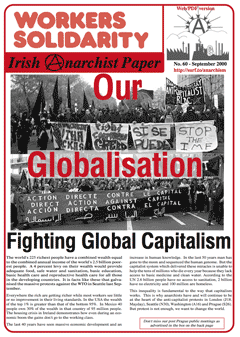Over 30 years of anarchist writing from Ireland listed under hundreds of topics
International
Letters on Cane Nero
Readers views on some controversy generated with the last issue
Cities of the future?
Purchase's proposal for more ecologically integrated communities usually meets with most scepticism when it is imagined applied to cities. Even a relatively small city, like Dublin, is almost completely dependent on food from neighbouring regions, and its ecosystem is made up of cars, people and concrete. If a city like New York or Mexico was sealed off from the rest of the world, it would die within days; the only question is whether it would be from starvation or asphyxiation. Given the number of such large cities around the world, and the fact that, even if it were possible, given the size of the earth's population, for everyone to live in small towns and rural communities, many would not want to, how can cities be accommodated within an environmentally sound anarchist society?
Space Aliens horrified by Earth
An alien spacecraft surveying the earth would surely be astounded by the 'civilisation' that inhabits it. On the one hand it has sent men to the moon and sequenced the human genome. On the other tens of millions die every year because they lack access to basic medicine and clean water. 2.6 billion people have no access to sanitation, 2 billion have no electricity and 100 million are homeless. How can this be?
Is Fight Club an anarchist film?
At the beginning of Fight Club, the unnamed narrator is cracking up. His job is meaningless, his life is empty, and his attempts to fill it by accumulating stuff - Ikea furniture, Calvin Klein clothes - are failing. His constant travelling, and acute insomnia, mean he's no longer sure where, why, or who he is anymore.
Thats capitalism - WS60
Speaking at the World Trade Organisation meeting in Washington, the foreign minister of Brazil lamented that if the next WTO meeting had to be held in an out of the way place, he preferred that it be held on a cruise ship instead of in the middle of the desert. He then gave an impassioned speech in which he opposed writing core labour standards into the WTO agreement and defended child labour. He went on to describe how in one region of Brazil, more than 5,000 children "help their families earn a little extra money" by hauling bags of coal from a dump yard to a steel mill.
Beyond the 'Days of action against global capital' summit protests
Amsterdam, Geneva, Cologne, Seattle, London, Washington, LA, Prague. What do these cities have in common? In the last four years they have been the site of a new phenomenon, the Global Protest. For decades, the organisations that manage capitalism have met to divvy up the world among themselves. For the first time, their role as dealers of poverty and misery has been exposed by thousands of angry protesters. The symbolic value of these protests cannot be under estimated. If only for a brief period of time, a few days here and there, people have come together to say 'Enough!'.
Origins of the IMF & World Bank & the anarchist alternative
If you've ever owed money to a bank, you'll know it's not a pleasant experience. Depending on whether they think you're good for the money, the bank will either screw you in the short term or milk you dry over the longer haul. Banks are in the business of making money and generally they'll stop at nothing to get their way.
From the Czech Republic: Why we organise against the IMF
The Czech anarchist organisation Solidarita/Organisation of Revolutionary Anarchists is working as part of INPEG, the Czech alliance organising the protests in Prague this September. In October one of their members will be speaking in Ireland about these protests. Vadim Barek, Solidarita's international secretary explains what the IMF means to workers in the Czech republic and why they are organising against the summit.
Migrant deaths due to Fortress Europe
They are the sort of deaths which rarely merit more than a passing reference in the mainstream media - a battered ship which sinks in the Mediterranean, a stowaway found dead in the cargo hold of a ship or plane, a nameless asylum seeker who takes his/her life, no longer able to take the pressure in one of the EU's many 'detention centres'. Now and again, as with the 58 Chinese people found dead in the back of a truck in Dover in June of this year, the cases are so horrific that they cannot be ignored. Then they become big news for a day or two only to sink off the political agenda just as quickly.
Our globalisation - Fighting Global Capitalism
 The world's 225 richest people have a combined wealth equal to the combined annual income of the world's 2.5 billion poorest people.
The world's 225 richest people have a combined wealth equal to the combined annual income of the world's 2.5 billion poorest people.

